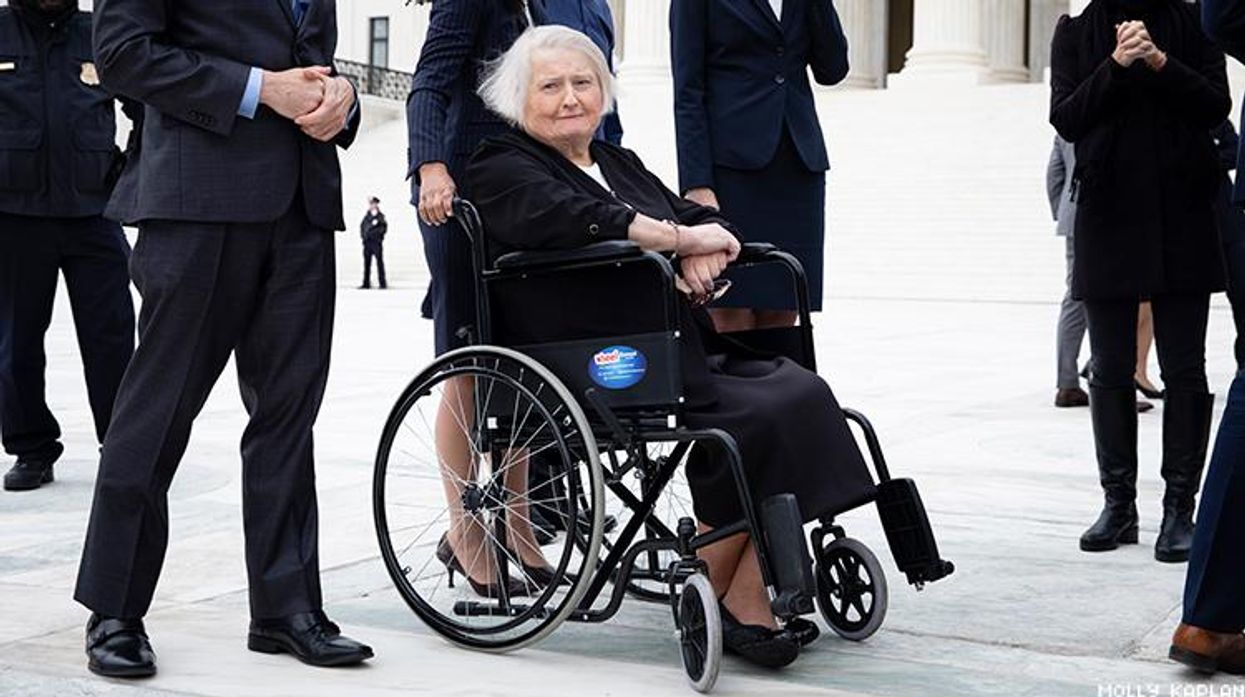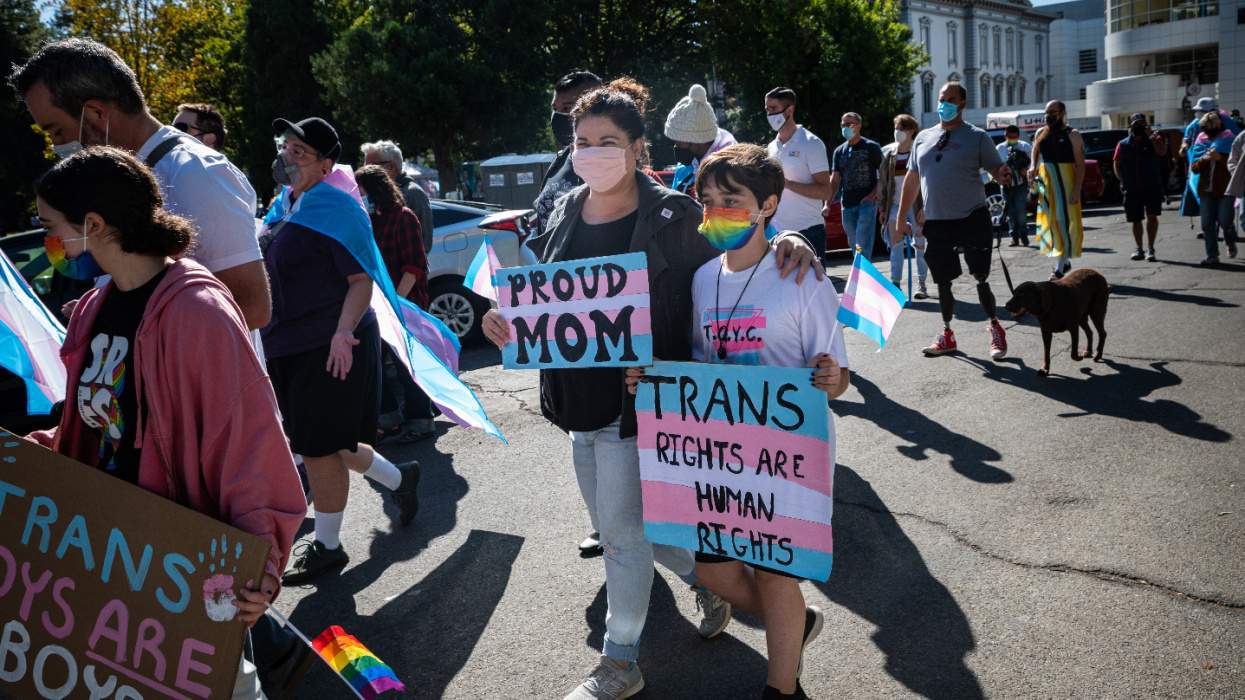Aimee Stephens, the Michigan transgender woman who took her discrimination case all the way to the Supreme Court, has died at age 59.
Stephens died Tuesday at her home in the Detroit metro area with her wife, Donna Stephens, at her side, according to the American Civil Liberties Union, which is representing her.
An ACLU press release did not state the cause of death, but Aimee Stephens had suffered from diabetes complications for years and had been undergoing life-sustaining dialysis treatments because of kidney failure. She had to discontinue dialysis, however, because her health had declined so much, her family disclosed this month. She was receiving home hospice care.
Stephens was working as a funeral director in the Detroit suburbs when she transitioned in 2013. Her employer, R.G. & G.R. Harris Funeral Homes, fired her after she informed them she would be presenting as female at work. She filed a complaint with the Equal Employment Opportunity Commission, then a lawsuit.
Her case was heard by the Supreme Court in October, along with two cases involving discrimination against gay men. The court's decision, expected soon, will determine whether existing federal law against sex discrimination covers discrimination based on sexual orientation and gender identity.
"Aimee did not set out to be a hero and a trailblazer, but she is one, and our country owes her a debt of gratitude for her commitment to justice for all people and her dedication to our transgender community," Chase Strangio, deputy director for Trans Justice with the ACLU's LGBT & HIV Project and a member of Stephens's legal team, said in the press release.
"When Aimee decided to fight back after she was fired for being transgender, she just wanted it to be acknowledged that what happened to her was wrong. Being a part of Aimee's team at the Supreme Court has been one of the proudest moments of my life because of the amazing person behind the case. As a member of her legal team, I am deeply sad for this loss. As a transgender person and an advocate, I am filled with both grief and rage that we have lost an elder far too soon. As we, and millions, carry her work for justice forward, may she rest in power and continue to guide us on this path.
"Those who met Aimee know that her power is in her humbleness and sincerity. She has been an inspiration to millions around the world. We mourn with Aimee's wife Donna, their daughter Elizabeth, and the millions who have been inspired by her."
Donna Stephens, who is not giving interviews, shared this statement: "Thank you from the bottom of our hearts for your kindness, generosity, and keeping my best friend and soul mate in your thoughts and prayers. Aimee is an inspiration. She has given so many hope for the future of equality for LGBTQ people in our country, and she has rewritten history. The outpouring of love and support is our strength and inspiration now."
The Human Rights Campaign also mourned Stephens, with the following statement from its president, Alphonso David:
"Aimee Stephens will be remembered as a trailblazer. All of us in the LGBTQ community owe her immense gratitude for her bravery in standing up for the right of LGBTQ people to live as ourselves at work and in every aspect of our lives. After being fired by her employer when she told them she was transgender, she was determined to fight back and took her case all the way to the Supreme Court, where it is pending. Aimee will always be a hero to transgender and nonbinary people and to the entire LGBTQ community. We share our deepest condolences with all of her friends and family, and especially her wife, Donna Stephens."
So did the National Center for Lesbian Rights, with a statement from its legal director, Shannon Minter:
"It is heartbreaking that Aimee Stephens has passed away before the resolution of her historic case, which is the culmination of decades of federal case law holding that Title VII protects transgender workers. No matter how her case is resolved, Aimee will be remembered as a central figure who helped to humanize transgender people and to highlight the discrimination faced by many transgender workers. Aimee's career was devoted to serving others and to living out her faith, which was an essential part of her identity. Like so many other transgender people, I am grateful for Aimee's courage and willingness to put herself on the line to stand up for the dignity and equality of all people."
Stephens knew she might not live to see the ruling in her case. "If I'm going to commit to this, we'll be in it to the end, and hopefully, if for some reason I don't live long enough to see the end, somebody will keep going," she said at a press conference last year.
After her death, her estate could still receive "compensatory and other damages," legal experts told The Detroit News.
Stephens had known she was female since childhood but did not start presenting as a woman, outside of work only, until she was in her 40s. She decided to transition at work after considering suicide over the stress of living a double life, she said in the press conference. "I chose life," she said.
When she came out as trans to her employer, she was told she had to continue wearing men's clothing at work to follow the company dress code. During her court case, Thomas Rost, the majority owner of Harris Funeral Homes, cited his religious belief that gender is God-given and immutable, and said that allowing Stephens to present as female would interfere with that.
Harris's lawsuit and those of two gay men, Donald Zarda and Gerald Bostock, argue that Title VII of the Civil Rights Act of 1964, in banning sex discrimination, also bans discrimination based on sexual orientation and gender identity. "Aimee was fired because of sex, the very definition of what it means to be transgender," ACLU of Michigan attorney Jay Kaplan said at last year's press conference.
A federal district court ruled that Title VII did not apply in Stephens's case, but an appeals court ruled that it did. The funeral home company then appealed to the Supreme Court; it is represented by the Alliance Defending Freedom, an anti-LGBTQ legal nonprofit.
The Equality Act, currently pending in Congress, would amend the Civil Rights Act and other federal statutes to explicitly state that the law bans discrimination based on sexual orientation and gender identity.
After Harris Funeral Homes fired Stephens, she found work as an autopsy technician at a Detroit hospital, the News reports. She retired at the end of 2014 because of her health problems.















Charlie Kirk DID say stoning gay people was the 'perfect law' — and these other heinous quotes
These are some of his worst comments about LGBTQ+ people made by Charlie Kirk.